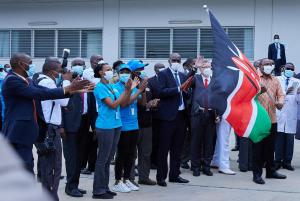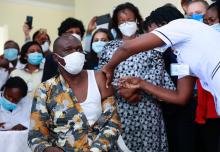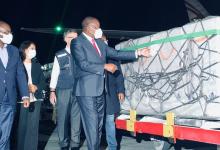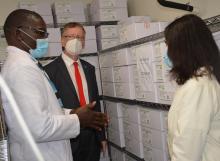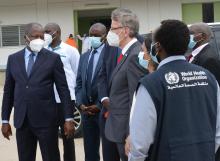Kenya receives COVID-19 vaccines and launches landmark national campaign
Kenya this week received the first batch of Astra Zeneca Vaccine, a milestone promise for a better tomorrow following an otherwise difficult year in dealing with the ravages of the COVID-19 pandemic. The 1.02 million doses of the Astra Zeneca-Oxford COVID-19 vaccine, arrived at Jomo Kenyatta International Airport, Nairobi, on Wednesday March 3, 2021 as part of the COVAX facility. This global initiative is working with governments and manufacturers to ensure COVID-19 vaccines are available worldwide to both higher-income and lower-income countries. The vaccines arrived on Qatar Airways flight QR1341, which was met at the airport by Cabinet Secretary for Health Hon Mutahi Kagwe, World Health Organization (WHO) Representative to Kenya, Dr Rudi Eggers, and UNICEF Representative to Kenya, Maniza Zaman.
The AstraZeneca-Oxford vaccine was manufactured by the Serum Institute of India (SII) and made available to the COVAX facility thanks to an advance purchase agreement between Gavi, the Vaccine Alliance and SII. The consignment of 1.02 million doses is part of an initial allocation to Kenya of 3.56 million doses. The vaccines were procured and transported by UNICEF's Supply Division in Copenhagen. In addition, COVAX is providing 1,025,000 syringes and 10,250 safety boxes to the country via a global stockpile funded and supported by Gavi. Kenya, however, already has enough in-country stocks of syringes and safety boxes for the first phase of vaccinations.
“This is a historic day for Kenya, marking an important milestone in our fight against COVID-19,” Cabinet Secretary for Health Hon Mutahi Kagwe said.
“This has been made possible by the leadership of His Excellency President Uhuru Kenyatta, the hard work of the Ministry of Health, and the cooperation of the Kenyan people over the past 11.5 months. I would like to thank WHO, GAVI and UNICEF for their support in procuring and transporting these life-saving vaccines,” he added
Kenya’s Ministry of Health has already launched its campaign and kicked off its deployment plan for the vaccines which are prioritized for frontline health workers and essential staff including security personnel. Vaccines are already being moved from central vaccine store to nine regional vaccine stores, from where the counties will collect and distribute the vaccines to local hospitals at county and sub-county level. The first vaccinations will take place at one nominated vaccinating health facility per county, the national referral hospitals and select private health facilities.
“The World Health Organization is honoured to be part of this unprecedented global vaccination campaign – the largest such response in human history,” WHO Representative to Kenya Dr. Rudi Eggers said.
“In the coming weeks, frontline health workers in Kenya will start to receive the vaccines, protecting them as they treat the victims of COVID, and provide essential health services. I can assure health workers and the Kenyan public that these vaccines are safe and effective. With this vaccination we will get much closer to end this pandemic,” he added.
“However, while these vaccines are being rolled out, please let us continue the public health measures in place, such as the masks, the social distancing and avoiding congested gatherings and settings.”
The campaign set off within hours of its arrival with the vaccination of the first person, Dr Patrick Amoth (index 001) who is the acting Director General at the Ministry of Health. This was followed by the vaccination of several health workers including the Chief Executive Officer of Kenya’s premiere health facility, Kenyatta National Hospital, Dr Evanson Kamuri and the head of the national vaccine immunization programme (NVIP), Dr Collins Tabu. Other frontline health workers are targeted to receive vaccination on voluntary basis in the coming weeks.
“Let me encourage other health care workers and Kenyans in general by setting the example”, Dr Amoth said. He said vaccination was one of the most important tools to deal with the pandemic but called on everyone to comply with the set protective measures in order to protect themselves and others. He assured Kenyans that the vaccine had undergone rigorous processes to ensure its safety and efficacy. President Uhuru Kenyatta flagged off the vaccine deployment to the countries from the central vaccine stores in the outskirts of Nairobi. He reiterated government’s commitment to ensure the exercise will succeed and called on Kenyans to comply with the protective protocol of washing hands, keeping distance and wearing a mask.



